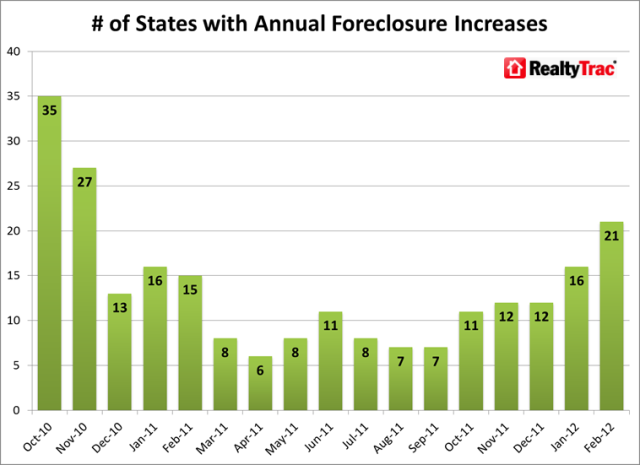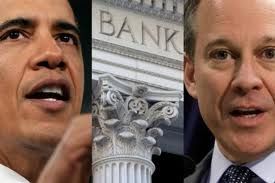Cross posted from The Stars Hollow Gazette
While the attention was on the SCOTUS ruling on the affordable Care Act, this is what was going on under the radar at the Federal Reserve:
Federal Reserve, Regulators Arguing for More, Quicker Foreclosures
by David Dayen
The Federal Reserve has decided to put their thumbs on the scales of justice, explicitly attempting to overturn state-based anti-foreclosure laws on the spurious grounds that they hurt the economy.
This story by Tim Reid in Reuters cites the Fed arguing against the kind of laws in states like Nevada – and soon, California – that have saved hundreds of thousands of homes from foreclosure.
“State and federal laws enacted to protect homeowners from eviction in the wake of the 2008 housing crash may be extending the slump, according to a growing number of economists and industry experts.
Foreclosures have all but ground to a halt in Nevada, which passed one of the stiffest borrower-protection laws in the country last year. Yet the housing market is further than ever from recovery, local real estate agents say, with a lack of inventory feeding a “mini-bubble” in prices that few believe is sustainable.
A recent U.S. Federal Reserve study found that in states requiring a judicial review for foreclosure, delays associated with the process had no measurable long-term benefits and often prolonged the problems with the housing market.”
There’s been a concerted effort to overturn due process in these judicial foreclosure states, on the theory that foreclosures must be quickly flushed through the system so the market can “clear.” Incredibly, house organs like the Fed still express this opinion even after years of documented evidence of illegal foreclosures using false and forged documents in court. The explicit recommendation from the Federal Reserve is to react to systematic foreclosure fraud by closing the courthouse doors to troubled borrowers.
The entire premise that judicial foreclosure states are prolonging the housing slump is completely spurious. Nothing furthers the housing slump more than a spate of foreclosures flooding the market, increasing the supply of distressed homes that sell cheaply and bringing down property values in a particular area. That’s what the Fed is arguing for.
Yes, they’re serious. This is basically siding with the banks, giving fraud as pass and screwing the homeowners and housing market with a flood of foreclosures. And Reuters and other trade publications have decided to publish the propaganda that keeping people in their homes is causing the market to slump and the solution is more foreclosures.
Freelance writer and attorney who helped expose the foreclosure fraud, Abigail Field takes on the Reuters “b.S.” sentence by sentence, shredding the propaganda that the housing crisis was caused by homeowners but by the banks themselves who created the shadow market of foreclosed homes and the underwater crisis. She makes these four points:
First, en route to committing mass securities fraud the banks dishonored their contracts and failed to document the mortgage loans as they promised investors they would. As a result, they’ve had to fabricate nonsensical, obviously fraudulent and often sworn statements to try to foreclose. It’s that swamp of fraud that’s causing the delays. Second, banks are manipulating housing market inventory, letting properties they own rot, not listing them for sale, and when auctioning them, sometimes outbidding third parties. Third, bankers’ securities fraud broke the secondary market for non-government backed mortgages. As a result, there’s a lot less capital to lend wannabe homeowners. Fourth, lender-driven appraisal fraud led to such inflated prices that the underwater problem is directly attributable to them. Rather than deal in the reality that our housing crisis is banker driven and dare push the meme that bankers must be held accountable, Reuters is helping bankers (and their government allies) push the idea that if only we made it easy for bankers to use their fraudulent documents, the housing market would heal quickly.
There’s even more that exposes not just the Federal Reserve’s pass on bank fraud but the how the Obama administration’s so called homeowner bail out is just more hand outs to the banks:
Sentences ten and eleven:
“The increasing doubt about the impact of anti-foreclosure laws on the long-term health of the housing market calls into question a basic principle of the Obama Administration’s approach to the housing crisis.
Many Democrats, including Obama, say struggling homeowners should get more time to make good on their mortgage arrears, or have the breathing room to renegotiate their loans with lenders, especially in the wake of the “robo-signing” scandal in which banks were found to have falsified foreclosure paperwork.”
How I wish the Obama Administration’s approach had really been about helping struggling homeowners. Instead it has been mostly theatrics with gifts to the banks thrown in. Most recent example – the latest refinancing program has become a fee/profit center for the big banks. Moreover, if homeowners did “make good”, that would be better for everyone involved, including the broader market, but in the era of maximally predatory servicing, it’s not easy. Ditto with mortgage mods that work – and when they include principal reduction that’s meaningful, they work.
Hey, look! In sentence 11 we get the first whiff of banker wrongdoing. And wow, he not only uses the misleading “robo-signing“, but he also says “falsified foreclosure paperwork.” Foreclosure “paperwork” doesn’t sound that serious, though, does it? How about “falsified documents affecting property title”? Or, “lied under oath about how much borrowers owed and to whom?”
And as Yves Smith at naked capitalism notes in her article the lies get repeated ad nauseum:
The way Big Lies get sold is by dint of relentless repetition. In the wake of the heinous mortgage settlement, foreclosure fatigue has set in. A lot of policy people want to move on because the topic has no upside for them. Nothing got fixed, the negotiation process took a lot of political capital (meaning, as we pointed out, it forestalls any large national initiatives in the near-to-medium term), and Good Dems don’t want to dwell on a crass Obama sellout (not that that should be a surprise by now). But the fact that this issue, which ought to be front burner given its importance both to individuals and the economy, is being relegated to background status creates the perfect setting for hammering away at bank-friendly memes. When people are less engaged, they read stories in a cursory fashion, or just glance at the headline, and don’t bother to think whether the storyline makes sense or the claims are substantiated.
Just look at the headline: “Evidence suggests anti-foreclosure laws may backfire.” First, it says there are such things as “anti-foreclosure laws.” In fact, the laws under discussion are more accurately called “Foreclose legally, damnit” laws. Servicers and their foreclosure mill arms and legs have so flagrantly violated long-standing real estate laws in how they execute foreclosures that some states have decided to up the ante in terms of penalties to get the miscreants to cut it out. [..]
And that is perhaps the most remarkable bit, the failure to consider that gutting the protections to the parties to a contract undermines commerce. Borrowers in judicial foreclosure states paid higher interest rates due to the greater difficulty of foreclosure. So now they are to be denied what they paid for because the banks recklessly disregarded the procedures they set up and committed to perform? What kind of incentive system is it when we reward massive institutional failure with a bank-favoring settlement and supportive messaging from central bank economists? As Dayen stated:
“So when these officials argue against laws like those in Nevada, which merely criminalize a criminal practice, or California, which provides due process for people having their homes taken from them, they’re arguing in favor of what amounts to a dissolution of justice.”
I don’t think you’ll read anything like this at Reuters. Shameful


 I realize that there has been a lot of speculation about what went down in the 24 hrs prior to the SOTU after Miller announced that there was no bank/state settlement deal. There is a lot of speculation about Schneiderman and not without good reason. When I was writing
I realize that there has been a lot of speculation about what went down in the 24 hrs prior to the SOTU after Miller announced that there was no bank/state settlement deal. There is a lot of speculation about Schneiderman and not without good reason. When I was writing  While there are there are many reasons to cheer President Obama’s announcement during his State of the Union address that he was
While there are there are many reasons to cheer President Obama’s announcement during his State of the Union address that he was